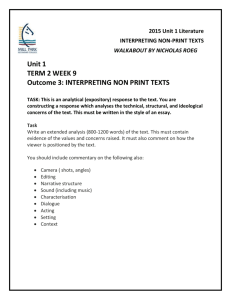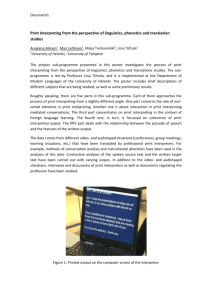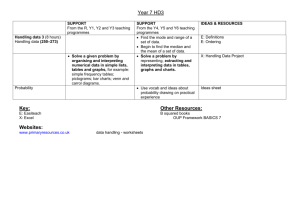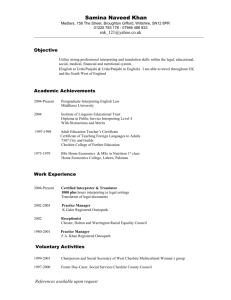IPP 231 Willig 08-11-05-2a
advertisement
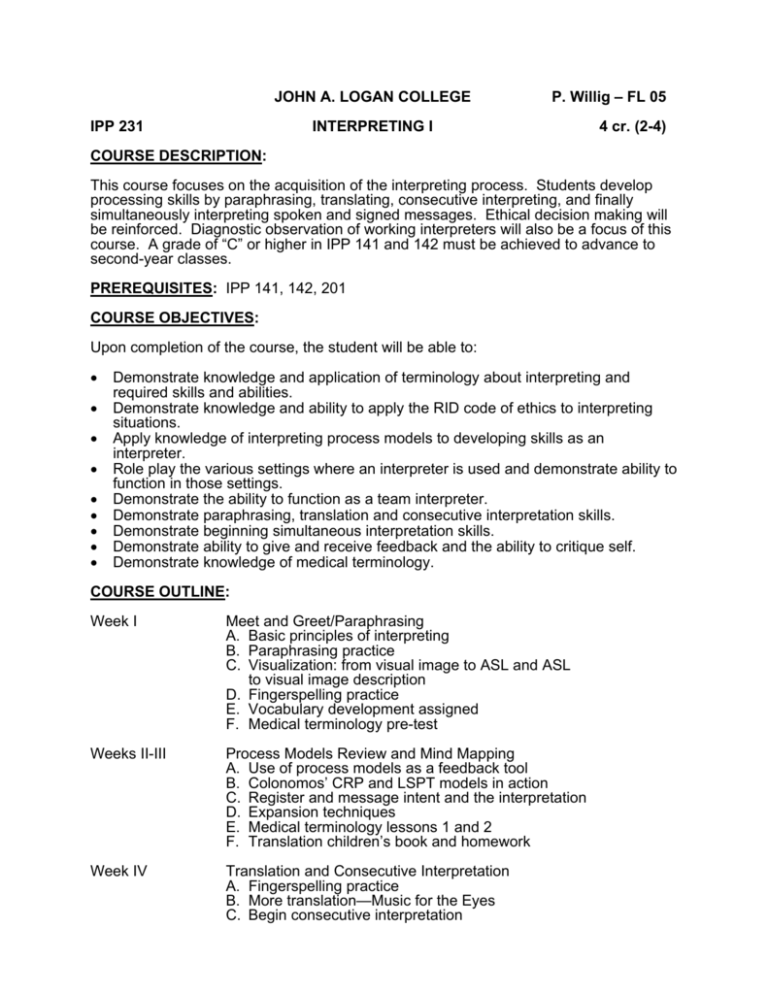
JOHN A. LOGAN COLLEGE IPP 231 P. Willig – FL 05 INTERPRETING I 4 cr. (2-4) COURSE DESCRIPTION: This course focuses on the acquisition of the interpreting process. Students develop processing skills by paraphrasing, translating, consecutive interpreting, and finally simultaneously interpreting spoken and signed messages. Ethical decision making will be reinforced. Diagnostic observation of working interpreters will also be a focus of this course. A grade of “C” or higher in IPP 141 and 142 must be achieved to advance to second-year classes. PREREQUISITES: IPP 141, 142, 201 COURSE OBJECTIVES: Upon completion of the course, the student will be able to: • • • • • • • • • Demonstrate knowledge and application of terminology about interpreting and required skills and abilities. Demonstrate knowledge and ability to apply the RID code of ethics to interpreting situations. Apply knowledge of interpreting process models to developing skills as an interpreter. Role play the various settings where an interpreter is used and demonstrate ability to function in those settings. Demonstrate the ability to function as a team interpreter. Demonstrate paraphrasing, translation and consecutive interpretation skills. Demonstrate beginning simultaneous interpretation skills. Demonstrate ability to give and receive feedback and the ability to critique self. Demonstrate knowledge of medical terminology. COURSE OUTLINE: Week I Meet and Greet/Paraphrasing A. Basic principles of interpreting B. Paraphrasing practice C. Visualization: from visual image to ASL and ASL to visual image description D. Fingerspelling practice E. Vocabulary development assigned F. Medical terminology pre-test Weeks II-III Process Models Review and Mind Mapping A. Use of process models as a feedback tool B. Colonomos’ CRP and LSPT models in action C. Register and message intent and the interpretation D. Expansion techniques E. Medical terminology lessons 1 and 2 F. Translation children’s book and homework Week IV Translation and Consecutive Interpretation A. Fingerspelling practice B. More translation—Music for the Eyes C. Begin consecutive interpretation 2 D. E. F. G. Notes on note taking Dress for interpreting a history class translation and consecutive interpretation exercises Medical terminology lesson 3 Week V Consecutive Interpretation A. Fingerspelling practice B. Code of ethics role play C. Dress for interpreting a doctor’s appointment D. Logs due E. Medical terminology lesson 4 Week VI Consecutive Interpretation A. Fingerspelling practice B. Consecutive interpretation exercises C. Dress for interpreting a science class D. Medical terminology lesson 5 Week VII Consecutive Interpretation A. Fingerspelling practice B. Victoria Falls C. Memory building exercises, texts 30 seconds to 1 minute D. Dress for interpreting a shop class E. Logs due F. Medical terminology lesson 6 Week VIII Consecutive Interpretation > Simultaneous Interpretation A. Fingerspelling practice B. Team technique/Role play C. Dress for an outpatient appointment at a hospital D. Interpreting homework (remember, you need 10 hours— 2 hrs./week for the rest of the semester) E. Medical terminology lesson 7 Week IX Consecutive Interpretation > Simultaneous Interpretation A. Fingerspelling B. Midterm text consecutively interpreted C. Dress for Success, lawyer’s appointment D. Logs due, speech outlines due E. Medical terminology lesson 8 Week X Speeches: Simultaneously Interpreted A. Speeches should be about a subject other than interpreting B. Speeches should be 5 minutes long in English C. Interpreters will interpret one speech into ASL D. Dress appropriately E. Medical terminology lesson 11 Week XI Consecutive Interpreting > Simultaneous Interpreting A. Fingerspelling exercises B. Target to complete vocabulary development hours C. Back translation activity D. Dress for interpreting an anatomy class E. Medical terminology lesson 9 3 Week XII Simultaneous Interpreting A. Fingerspelling B. Deaf interpreting team techniques C. Dress for interpreting police emergency D. Logs due E. Medical terminology lesson 10 Week XIII Feedback A. Fingerspelling B. Feedback and self critique C. Logs due D. Dress for emergency interpreting history, art, and shop classes E. Medical terminology lesson 12 Weeks XIV-XV Simultaneous Interpreting A. Fingerspelling B. Simultaneously interpreting texts C. Team techniques/Ethics role play D. Dress for interpreting 3 classes: history, art and shop E. Dress for biology and graduate level linguistics (Week XV) F. Final logs due (including documented interpreting hours) G. Medical terminology lessons 13 and 14 Week XVI Final and Medical Terminology Post-Test COURSE REQUIREMENT: Students will be expected to prepare assigned materials prior to class. This semester we will focus on the interpreting process from English to ASL. We will begin learning the interpreting process by paraphrasing, translating, consecutive interpreting, and finally simultaneous interpreting. Expectations of the students: • • • • • • The students will be expected to participate in role playing situations. The students will be expected to prepare a 5 minute presentation in English to be interpreted into ASL by a member of the class. Both presentation and interpretation will be graded. The students will be expected to prepare a self critique of his/her interpretation and participate in a feedback meeting with the instructor. The students will observe the work of professional interpreters. The students will journalize their observations. Journals will be due on listed dates. Failure to hand in journals on the due date will result in an E for that date. Journals will be graded on an A, B, C scale. Twenty hours of observation are required. No more than four hours of observation can be done with the same interpreter or in the Learning Lab. Students will introduce themselves to the interpreter before the class begins, ask the interpreter to sign their log form and give the interpreter a thank you card mentioning something that the student liked about their interpretation. On Thursdays, students are expected to dress as if they were interpreting for the assignment listed on each given week. Feedback will be given about clothing choice. Students will complete ten hours of documented interpreting (English to ASL). The instructor will assign some texts that will satisfy some of this requirement. The rest of the hours can be earned interpreting in the classroom or other approved sites. 4 • • • Students will complete 10 hours of vocabulary development over the course of the semester. Emphasis should be placed on developing ASL vocabulary. It is suggested that vocabulary development hours be in conjunction with interpreting hours and that students research the vocabulary that they encounter while interpreting. At least three hours of those ten are to be spent using the IPP software (CD-ROM) in the Desk Lab. The instructor will assign some vocabulary tapes which can serve to satisfy some of the required vocabulary hours. Students will be expected to complete several assignments on videotape. These assignments and other homework is expected to be completed on time. One day late will result in a lowered letter grade. One week late is a zero. Students will complete the 14 lesson courses in Medical Terminology and tests. Attendance. Attendance is imperative. More than three unexcused absences will result in a lowered grade. Three late arrivals to class are considered to be equal to one unexcused absence. Team Work. Interpreters are often called upon to work in teams. As a profession we are also a team and must learn to support each other and be supported by one another. Because of this, working together in a collegial manner will be expected. Working in a collegial manner includes: • • • • • • Supporting each other inside and outside of the classroom, while with each other and behind each other’s back. If you have an issue with another person, discuss the issue with that person in a calm manner. Do not discuss the issue with other people while failing to discuss it with that person. Often problems can be solved easily if nipped in the bud. Most problems come from misunderstanding and miscommunication. When talking with one another about an interpretation, discuss the interpretation, not the interpreter. Discussion should take place in a non-judgmental, mutually supportive environment. Because each of us have different personalities, we may have difficulty working with some people. Do your best to work with them, being honest with yourself about your conflict. Do not blame the other person for your inability to work with them. Most of all, communicate, communicate, communicate! Show respect for the other students and for your instructor by giving full attention to the work at hand. Student Success Center. Tutors may be obtained through the Student Success Center. Contact the staff in C219 if this service is desired. John A. Logan College will make reasonable accommodations for students with documented disabilities under Section 504 of the Rehabilitation Act of 1973, and the Americans with Disabilities Act of 1990. Any student with a disability that may have some impact on work in this class, who feels she/he needs an accommodation, should make an appointment with the Coordinator of Services for Students with Disabilities on campus, Christy McBride, Room C219B, Ext. 8516. Before services can be provided, this advisor must determine eligibility and arrange appropriate academic adjustments. It is the student=s responsibility to register in advance of a school term with this office and to turn in a schedule each term to ensure that there is every opportunity for success in this class. English Writing Center/Tutoring. For assistance with writing assignments in any college courses, students are encouraged to visit “The Write Place” in Room E109. English instructors are available for one-on-one tutoring each semester during hours posted at the center. 5 Financial Aid. Students who receive financial assistance and completely withdraw from classes prior to 60% of the semester being completed (approximately 2-3 weeks after midterm) could be responsible to return a portion of their Federal Pell Grant award. Prior to withdrawing from courses, students should contact the Financial Aid Office. METHOD OF EVALUATION: Medical Terminology Vocabulary Development Midterm Exam Final Exam Presentations and Interpretations Journals and Observation Interpreting in the Classroom 10% 5% 20% 25% 15% 15% 10% Grading Scale: 93 85 78 69 - 100% - 92% - 84% - 77% A B C D METHOD OF PRESENTATION: This class is primarily a lab class and will be conducted with a hands-on approach to learning. Students will participate in role play, small group discussions, and text analysis. Video tapes and live presentations will be used to give students ample practice in developing interpretation skills. TEXT: Vaughn, Dean. Vaughn Medical Terminology. Westwood, MA: DCM/Instructional Systems, 1997. Readings will be taken from various texts. Students will be responsible to complete readings before coming to class. Materials. The students are required to have two video tapes and two audio tapes for this semester. They are also required to wear appropriate attire for assigned classes. They are required to purchase a package of 20 thank you notes. INSTRUCTOR: Paula M. Willig, Associate Professor Office: D268 Ext: 8456 DATE: Fall, 2005 6 John A. Logan College Telephone Numbers Carterville and Williamson County ................................................... 985-3741 (operator) 985-2828 (direct extension access) Carbondale and Jackson County ..................................................... 549-7335 (operator) 457-7676 (direct extension access) Du Quoin ...........................................................................................................542-8612 West Frankfort...................................................................................................937-3438 Crab Orchard, Gorham, & Trico areas ....................................................1-800-851-4720 TTY (hearing-impaired access) .........................................................................985-2752 John A. Logan College does not discriminate on the basis of race, religion, color, national origin, disability, age, or gender. 08-11-05-2a

